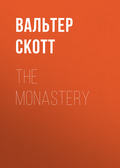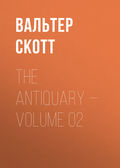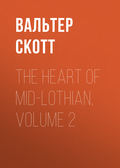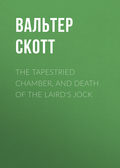
Вальтер Скотт
The Fortunes of Nigel
Note XVIII. p. 325. – KING JAMES’S TIMIDITY
The fears of James for his personal safety were often excited without serious grounds. On one occasion, having been induced to visit a coal-pit on the coast of Fife, he was conducted a little way under the sea, and brought to daylight again on a small island, or what was such at full tide, down which a shaft had been sunk. James, who conceived his life or liberty aimed at, when he found himself on an islet surrounded by the sea, instead of admiring, as his cicerone hoped, the unexpected change of scene, cried TREASON with all his might, and could not be pacified till he was rowed ashore. At Lockmaben he took an equally causeless alarm from a still slighter circumstance. Some vendisses, a fish peculiar to the Loch, were presented to the royal table as a delicacy; but the King, who was not familiar with their appearance, concluded they were poisoned, and broke up the banquet “with most admired disorder.”
Note XIX. p. 328. – TRAITOR’S GATE
Traitor’s Gate, which opens from the Tower of London to the Thames, was, as its name implies, that by which persons accused of state offences were conveyed to their prison. When the tide is making, and the ancient gate is beheld from within the buildings, it used to be a most striking part of the old fortress; but it is now much injured in appearance, being half built up with masonry to support a steam-engine, or something of that sort.
Note XX. p. 361. – PUNISHMENT OF STUBBS BY MUTILATION
This execution, which so captivated the imagination of Sir Mungo Malagrowther, was really a striking one. The criminal, a furious and bigoted Puritan, had published a book in very violent terms against the match of Elizabeth with the Duke of Alencon, which he termed an union of a daughter of God with a son of antichrist. Queen Elizabeth was greatly incensed at the freedom assumed in this work, and caused the author Stubbs, with Page the publisher, and one Singleton the printer, to be tried on an act passed by Philip and Mary against the writers and dispersers of seditious publications. They were convicted, and although there was an opinion strongly entertained by the lawyers, that the act was only temporary, and expired with Queen Mary, Stubbs and Page received sentence to have their right hands struck off. They accordingly suffered the punishment, the wrist being divided by a cleaver driven through the joint by force of a mallet. The printer was pardoned. “I remember,” says the historian Camden, “being then present, that Stubbs, when his right hand was cut off, plucked off his hat with the left, and said, with a loud voice, ‘God save the Queen!’ The multitude standing about was deeply silent, either out of horror of this new and unwonted kind of punishment, or out of commiseration towards the man, as being of an honest and unblamable repute, or else out of hatred to the marriage, which most men presaged would be the overthrow of religion. ’ – CAMDBN’S Annals for the Year 1581.
Note XXI. p. 375. – RlCHIE MONIPLIES BEHIND THE ARRAS
The practical jest of Richie Moniplies going behind the arras to get an opportunity of teasing Heriot, was a pleasantry such as James might be supposed to approve of. It was customary for those who knew his humour to contrive jests of this kind for his amusement. The celebrated Archie Armstrong, and another jester called Drummond, mounted on other people’s backs, used to charge each other like knights in the tilt-yard, to the monarch’s great amusement. The following is an instance of the same kind, taken from Webster upon Witchcraft. The author is speaking of the faculty called ventriloquism.
But to make this more plain and certain, we shall add a story of a notable impostor, or ventriloquist, from the testimony of Mr. Ady, which we have had confirmed from the mouth of some courtiers, that both saw and knew him, and is this: – It hath been (saith he) credibly reported, that there was a man in the court of King James his days, that could act this imposture so lively, that he could call the King by name, and cause the King to look round about him, wondering who it was that called him, whereas he that called him stood before him in his presence, with his face towards him. But after this imposture was known, the King, in his merriment, would sometimes take occasionally this impostor to make sport upon some of his courtiers, as, for instance: —
“There was a knight belonging to the court, whom the King caused to come before him in his private room, (where no man was but the King, and this knight and the impostor,) and feigned some occasion of serious discourse with the knight; but when the King began to speak and the knight bending his attention to the King, suddenly there came a voice as out of another room, calling the knight by name, ‘Sir John, Sir John; come away, Sir John;’ at which the knight began to frown that any man should be unmannerly as to molest the King and him; and still listening to the King’s discourse, the voice came again, ‘Sir John, Sir John; come away and drink off your sack.’ At that Sir John began to swell with anger, and looked into the next room to see who it was that dared to call him so importunately, and could not find out who it was, and having chid with whomsoever he found, he returned again to the King. The King had no sooner begun to speak as formerly, but the voice came again, ‘Sir John, come away, your sack stayeth for you.’ At that Sir John began to stamp with madness, and looked out and returned several times to the King, but could not be quiet in his discourse with the King, because of the voice that so often troubled him, till the king had sported enough.” – WEBSTER on Witchcraft, p. 124.
Note XXII. p. 393. – LADY LAKE.
Whether out of a meddling propensity common to all who have a gossiping disposition, or from the love of justice, which ought to make part of a prince’s character, James was very fond of enquiring personally into the causes celebres which occurred during his reign. In the imposture of the Boy of Bilson, who pretended to be possessed, and of one Richard Haydock, a poor scholar, who pretended to preach during his sleep, the King, to use the historian Wilson’s expression, took delight in sounding with the line of his understanding, the depths of these brutish impositions, and in doing so, showed the acuteness with which he was endowed by Nature. Lady Lake’s story consisted in a clamorous complaint against the Countess of Exeter, whom she accused of a purpose to put to death Lady Lake herself, and her daughter, Lady Ross, the wife of the Countess’s own son-in-law, Lord Ross; and a forged letter was produced, in which Lady Exeter was made to acknowledge such a purpose. The account given of the occasion of obtaining this letter, was, that it had been written by the Countess at Wimbledon, in presence of Lady Lake and her daughter, Lady Ross, being designed to procure their forgiveness for her mischievous intention. The King remained still unsatisfied, the writing, in his opinion, bearing some marks of forgery. Lady Lake and her daughter then alleged, that, besides their own attestation, and that of a confidential domestic, named Diego, in whose presence Lady Exeter had written the confession, their story might also be supported by the oath of their waiting-maid, who had been placed behind the hangings at the time the letter was written, and heard the Countess of Exeter read over the confession after she had signed it. Determined to be at the bottom of this accusation, James, while hunting one day near Wimbledon, the scene of the alleged confession, suddenly left his sport, and, galloping hastily to Wimbledon, in order to examine personally the room, discovered, from the size of the apartment, that the alleged conversation could not have taken place in the manner sworn to; and that the tapestry of the chamber, which had remained in the same state for thirty years, was too short by two feet, and, therefore, could not have concealed any one behind it. This matter was accounted an exclusive discovery of the King by his own spirit of shrewd investigation. The parties were punished in the Star Chamber by fine and imprisonment.

CALF-WARD, place where calves are kept in the field.
CALLAN, CALLANT, lad.
CANNILY, cautiously, skilfully.
CANNY, quiet.
CANTLE, crown of the head.
CARCANET, necklace.
CARLE, fellow.
CARLE-HEMPIE, the strongest stalk of hemp.
CARNIFEX, executioner.
CAUFF, chaff.
CAULDRIFE, chilly.
CA’T, call it.
CAUP, cup.
CAUSEY, pavement.
CERTIE, faith, in truth.
CHALMER, chamber.
CHANGE-HOUSE, roadside inn where horses are changed on a journey.
CHALK, slash.
CHAPPIT, struck.
CHEEK-BY-JOWL, CHEEK-BY-CHOWL, side by side.
CHEERY, dagger.
CHENZIE-MAIL, chain-mail.
CHIELD, fellow.
CHOPINES, high shoes or clogs.
CHUCKS, chuck-stones, as played by children.
CHUFFS, clowns, simpletons.
CLAITHING, clothing.
CLAPPED LOOFS, crossed palms.
CLATTER-TRAPS, rattle-traps.
CLAUGHT, snatched.
CLAVERING, idle talking.
CLEEK, hook.
CLEW, clue.
CLOOT, hoof.
CLOUR, blow.
CLOUTING, mending.
COCK-A-LEEKIE, COCK-A-LEEKY, leek soup in which a cock has been boiled.
COIF, linen covering for the head.
COMPLOTS, plots, intrigues.
COMPT, list, account, particulars.
COMPTING-ROOM, counting-house.
COSHERING, being familiar and intimate.
COUP, barter.
COUP THE CRANS, go to wreck and ruin.
COUPIT, tumbled.
CRAIG, rock; also neck.
CRAP, creep.
CRAW’D SAE CROUSE, crowed so proudly.
CULLY, one easily deceived, a dupe.
CURN, grain.
CUSSER, stallion.
CUTTY-QUEAN, a loose woman.
DAFT, silly, mad.
DAIKERING, jogging or toiling along.
DANG, driven, knocked.
DEIL, devil.
DEUTEROSCOPY, a meaning beyond the original sense.
DIDNA, did not.
DIKE-LOUPER, a debauchee.
DIRDUM, uproar, tumult. DIRKED, stabbed with a dirk.
DONNERIT, stupefied.
DOOMS, very, absolutely.
DOUCE, quiet, respectable, sober.
DOVER, neither asleep nor awake.
DOWCOT, dove-cote.
DRAB, illicit sexual intercourse.
DRAFF, drains given to cows; also the wash given to pigs.
DRAFF-POKE, bag of grains.
DREDGING-BOX, a box with holes for sprinkling flour in cookery.
DROUTHY, thirsty.
DUD, rag.
DUKE OF EXETER’S DAUGHTER, a species of rack in the Tower of London.
DULE-WEEDS, mourning.
DUMMALAFONG, a common prey to all comers.
DUNTS, blows.
EARD, earth.
EEN, eyes.
ELRITCH, hideous.
ENOW, just now.
ENSAMPLE, example.
EVITED, avoided.
EXIES, hysterics.
FALCHION, a short broadsword with a slightly curved point.
FALSET, falsehood.
FAUSE, false.
FASH, trouble.
FASHIOUS, troublesome, annoying.
FENCE-LOUPER, rakish fellow.
FEBRIFUGE, a medicine to subdue a fever.
FIDUCIARY, trustee.
FLATCAPS, citizens, civilians.
FLEECHING, flattering.
FOOD FOR FAGGOTS, martyrs for their religious opinions.
FOOT-CLOTH, horse-cloth reaching almost to the ground.
FOUARTS, house-leeks.
FOULWART, pole-cat.
FRAE, from.
FRESCO, half-naked.
FULE, fool.
FULHAM, loaded dice.
GAGE, pledge, trust.
GANG A’ AE GATE, go all one way.
GAR, make, force.
GARR’D, made, compelled.
GATE, way, road; also kind of.
GEAR, property.
GIFF-GAFF, give and take, tit for tat.
GIE THE GLAIKS, to befool, deceive.
GILLIE-WHITE-FOOT, running footman.
GILLRAVAGER, plunderer.
GIRNED, grinned.
GLAIKS, deception.
GLEED, awry, all wrong.
GOUD-COUK, fool.
GRAFFS, graves.
GRAMERCY, great thanks.
GRANDAM, old woman, grandmother.
GRAT, cried.
GREEN GEESE, parrots.
GREET, cry.
GREW, shudder.
GRIPS, handshakings, greetings.
GROSART, GROSSART, goose-berry.
GULL, one easily befooled,
GULLEY, large knife.
GUTTERBLOOD, one meanly bred.
GYNOCRACY, petticoat government.
HAET, thing.
HAFFITS, sides of the head.
HAFT, handle.
HAIRBOURED, resided, sojourned.
HAMESUCKEN, assaulting a man on his own premises.
HANKED, coiled.
HARLE, drag, trail.
HARMAN BECK, constable.
HEART-SCALD, disgust.
HEAD-TIRE, head-dress.
HECK AND MANGER, in comfortable quarters.
HEUGHS, glens.
HIRDIE-GIRDIE, topsy-turvy.
HIRPLING, limping, walking lame.
HIRSEL, flock.
HORSE-GRAITH, harness.
HOUGHS, hollows.
HOWFF, rendezvous, place of resort.
ILK ANE, each one.
ILL, bad.
ILL REDD-UP, very untidy.
ILL-WILLY, ill-natured.
INGINE, ingenuity.
INGOTS, masses of unwrought metal.
INGRATE, an ungrateful person.
IRON CARLES, iron figures of men.
JAW, wave.
JEDDART-STAFF, a species of battle-axe peculiar to Jedburgh.
JENNET, a small Spanish horse.
JINGLE, dance.
JOUP, dip, stoop down.
KEMPING, strife.
KENNING, knowledge.
KIMMER, gossip, neighbour.
KIRK, church.
KITTLE, ticklish, difficult, precarious.
KYTHED, seemed, appeared.
LAIGH, low.
LAIR, learning.
LAMB’S-WOOL, a beverage made of the pulp of roasted apples.
LANDLOUPER, adventurer, runagate.
LANG SYNE, long ago.
LATTEN, plated iron or brass.
LAVROCK, lark.
LEASING-MAKING, uttering treasonable language.
LEASINGS, falsehoods, treason.
LEGLIN-GIRTH, the lowest hoop on a leglin, or milk-pail.
LICK, a beating.
LIEFEST, most beloved.
LIFT, steal.
LIGHT O’ LOVE, mistress, wanton woman.
LINKBOYS, juvenile torch-bearers.
LIST, like.
LITHER, soft.
LOOF, palm of the hand.
LOON, LOUN, rascal.
LOUPING, leaping.
LUG, LUGG, ear.
LUVE, love.
MAIR THAN ANCE, more than once.
MARLE, wonder, marvel.
MAGGOT, whim, fancy.
MELL, intermeddle.
MENSEFUL, modest, mannerly.
MERK, a Scottish coin, value 13s 4d.
MESS-BOOK, mass-book, Catholic prayer-book.
MICKLE, MUCKLE, much, great, large.
MINT, attempt.
MIRK, dark.
MISLEARD, unmannerly.
MORT-CLOTH, shroud.
MOTION, puppet-show.
MUCKLE v. MICKLE.
MUFFLED, disguised.
MUSKETOON, a species of musket.
MY GERTIE, my goodness! gracious!
NEB, nose, point.
NEEDSNA, need not.
NICHER, snigger.
NICKS, notches.
NIFFER, exchange.
NOBLE, a gold coin, value 6s. 8d. sterling.
NOWTE, black cattle.
NUNCHION, luncheon, food taken between meals.
OR, before.
OTHER GATE, other kind of.
OWER SICKER, too careful.
PAIK, fight, chastise.
PANGED, crammed.
PAPISTRIE, Popery.
PEASE-BOGLE, scarecrow among the pease growing.
PENNY-WEDDING, a wedding where all who attend contribute a trifle towards the expenses of the merrymaking.
PICKTHANK, a parasitical informer.
PIG, earthen pot, vessel, or pitcher.
PINK, stab, pierce holes into.
PLACK, a copper coin, value the third part of an English penny.
PLOY, trick.
POCK-END, empty pocket or purse.
POCK-PUDDING, bag pudding.
POORTITH, poverty.
PORK-GRISKINS, sucking-pigs; also broiled loin of pork.
POUCH, pocket.
PRIE, taste.
PULLET, a young hen.
QUEAN, wench, young woman.
RAMPALLIONS, low women.
RAVE, tore.
RAXING, stretching.
REDDING-KAME, hair-comb.
REDD-UP, tidy, put in order.
RED WUD, stark mad.
REIRD, shouting.
REMEID, resource, remedy.
ROOPIT, croupy, hoarse.
ROSE-NOBLE, a gold coin, value 6s. 8d., impressed with a rose.
ROUT, ROWT, to roar or bellow.
RUDAS, wild, forward, bold.
SAAM, same.
SACK, sherry or canary wine, warmed and spiced.
SACKLESS, innocent.
SCAT, tribute, tax.
SCAUDING, scalding.
SCAUR, scare, frighten.
SCLATE-STANE, slate-stone.
SCRIVENER, one who draws up contracts.
SHABBLE, cutlass,
SHOON, shoes.
SHOUTHER, shoulder.
SHULE, shovel.
SIB, related.
SIBYL, prophetess.
SICKER, careful.
SICLIKE, just so.
SILLER, money, silver.
SIRRAH, sir!
SKEIGH, skittish.
SKELDER, plunder, snatch.
SLEEVELESS, thriftless.
SMAIK, mean, paltry fellow.
SNAP-HAUNCHES, firelocks.
SPANG, spring.
SPEER, ask.
SPEERINGS, information, inquiries.
SPRAIKLE, to get on with difficulty.
SPUNK, slip.
SPUNKIES, will-o’-the-wisps.
STEEKING, closing.
STEEKIT, shut.
STONERN, stone.
STOT, a bullock between two and three years old.
STRAND-SCOURING, gutter-raking.
STURDIED, afflicted with the sturdy, a sheep disease.
STYPIC, astringent, something to arrest haemorrhage.
SUCCORY-WATER, sugar water.
SUNDOWN, sunset.
SUNER, sooner.
SUMPTER HORSE, pack-horse.
SWITH, begone! be off!
SYNE, ago.
TAIT, lock.
TANE, the one.
TAWSE, leather strap used for chastisement.
TEINDS, tithes.
THROUGH-STANES, gravestones.
TIKE v. TYKE.
TINT, lost.
TITHER, the other.
TOCHER, dowry.
TOOM, empty.
TOUR, see.
TOUT, blast on the horn.
TOYS, goods.
TREEN, wooden.
TROTH, truth.
TROW, believe, guess.
TRYSTE, appointment.
TURN-BROCHE, turn-spit.
TYKE, TIKE, dog, cur.
TWA, two.
TWIRING, coquetting, making eyes at.
UMQUHILE, late, deceased.
VIVERS, victuals.
WAD, pledge.
WADNA, would not.
WADSET, mortgage.
WANION, misfortune.
WARE, spend.
WARLOCKS, wizards.
WASTRIFE, waste, extravagance.
WAUR, worse.
WEEL KEND, well known.
WHA, who.
WHEEN, few, a number of.
WHIGMALEERY, trinkets, nicknacks.
WHILK, which.
WHINGER, cutlass, long knife.
WHINYARD, sword.
WHOMBLE, upset.
WIMPLED, wrapped up.
WINNA, will not.
WITHY, gallows rope.
WOO’, wool.
WYLIE-COAT, under-petticoat.
WYND, street, alley.
WYTE, blame.
YESTREEN, last night.







